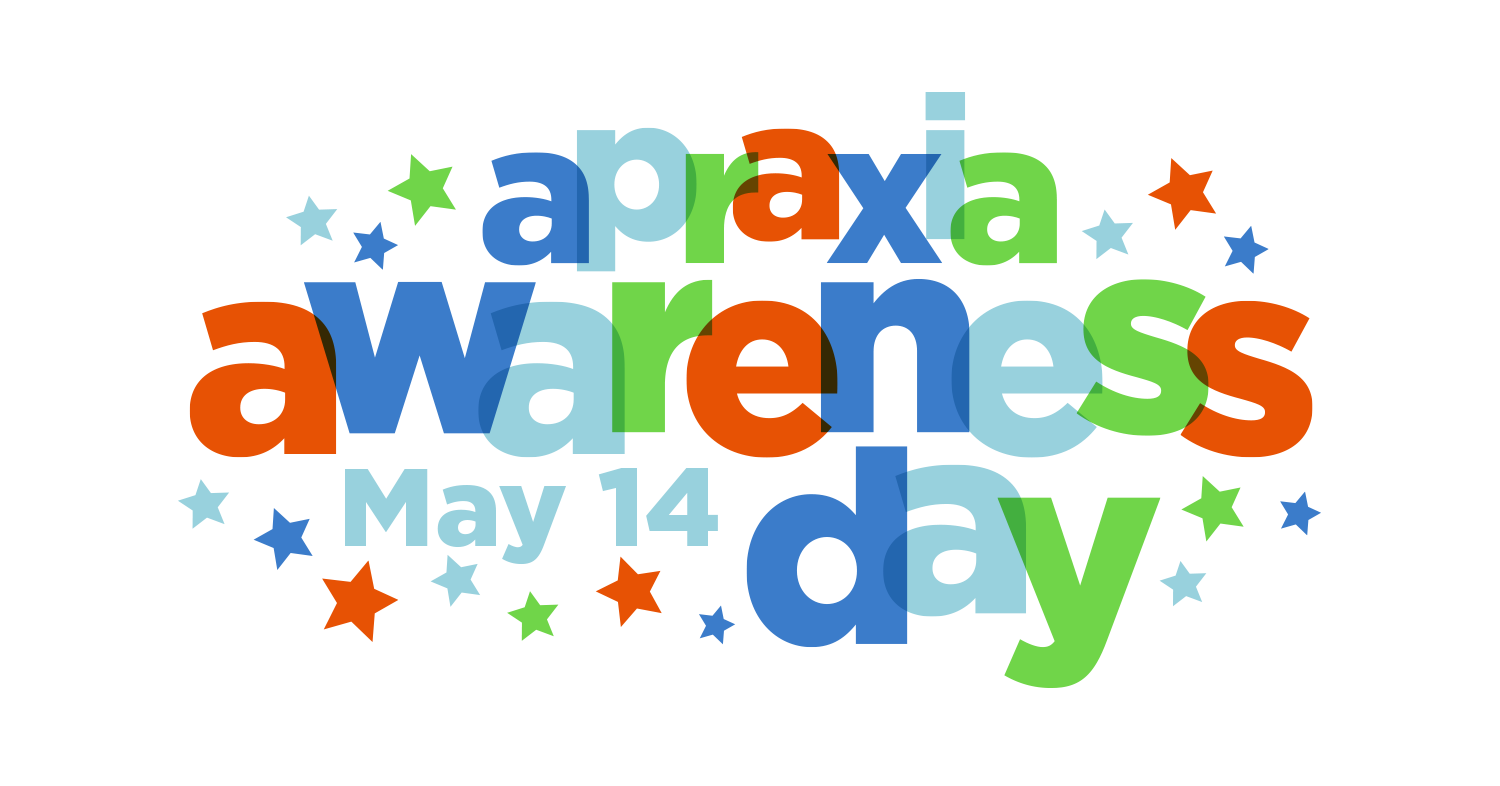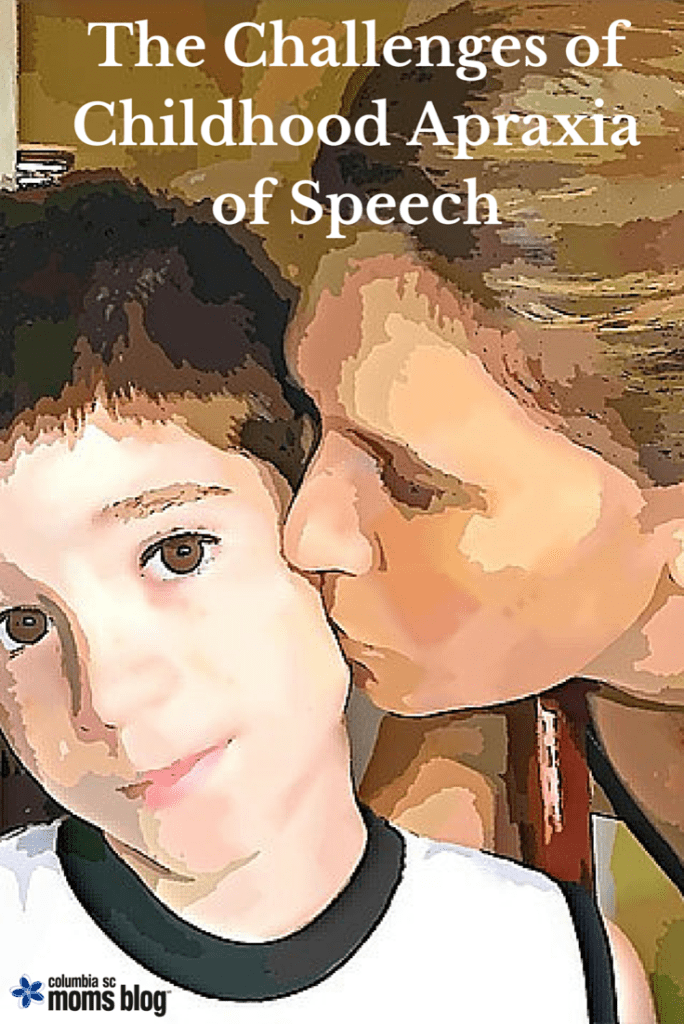
Last year, I entered a new mommy club, the club for moms of special needs children. Our son began receiving early intervention services at 18 months old because of a speech delay that I shared with this community last year. By the age of two, we had a working diagnosis of childhood apraxia of speech, and now, a year later, we have an IEP in hand and have transitioned from Babynet (South Carolina’s early intervention provider) to speech through the public schools.
Apraxia is a oral-motor speech disorder, meaning that children who have this generally understand normal speech and even know what they want to say, but they have trouble controlling the muscles and nerves in their mouth to make the sounds they need to communicate the thoughts they have. It is similar to someone who suffers a stroke and has to learn how to speak again . . . except that children with apraxia have this from infancy, and so must learn speech while dealing with it.
As disabilities go, apraxia is among the less serious (although it is one of the most serious speech disorders). It does not threaten my son’s life or health (unless he gets lost and cannot tell anyone his name, or gets sick and cannot tell us where or how it hurts…).
We do not need to care for his physical needs in any special way, and we even have hope that with intensive speech therapy, his apraxia will be resolved, perhaps by the time he is in middle school. All of which makes me feel dreadfully unqualified to even refer to myself as a “special needs mom.”
But even so, this last year has given me a better understanding of what many, many parents face everyday, and I share this today, Apraxia Awareness Day, both as a glimpse into our world of dealing with childhood apraxia of speech, and also because I suspect there are elements of my journey common to parents and children dealing with any kind of special needs.
So what is so challenging about parenting a child with special needs in general and apraxia in particular?
The Appointments
We started with one early intervention appointment a week, then added in another for speech therapy and then a second speech therapy appointment when one didn’t seem to be enough. All of this was in our home, so we didn’t have to drive anywhere, but it was still three chunks of time every week that we need to plan for and plan around.
And then there are other appointments.
One week in March, we had those three appointments, a public school screening, and a medical appointment, all in one week. Now we have three speech appointments a week at our local public school, so it is close by, but still a drive. It gets tiring. And although we are fortunate enough to have a great therapist and have speech therapy provided by the public schools, should we ever need to pursue private therapy, that will probably be paid for completely by us — because our health care insurance does not cover speech therapy except for autism or “speech recovery.” Many insurance companies don’t, making the process of getting help for our children a real struggle.
The Rest of the World
The rest of the world, mostly, does not understand our son’s issues. It doesn’t bother us to explain it, so we do, but it does get tiring. And we can’t foresee every miscommunication between our son and other children, or between our son and other adults. I want to shield my son from all of those possible hurts, but I can’t. For now, also, we are his voice to the world, his interpreters. I wonder often if I am doing him justice in this, and I am anxious whenever I leave him in the care of others who may or may not be able to understand him.
The Future
I try not to worry about it. I read the success stories from other parents of kids whose apraxia was resolved by middle school, or at least by high school, but that seems a long way away. And we don’t know for certain. This could be something he struggles with his whole life. I pray, a lot, for him and for the strength to guide him through this to the future that God has for him. But I’m also a mom, and sometimes it worries me.
The Everyday Stuff
Our daily life consists of a lot of very careful listening and watching, as our son uses sign language more than speech. We also have a lot of miscommunication and tears of frustration (him and me!), though using Sign helps us immensely. I never realized how much I took my daughter’s communication skills for granted until that didn’t come naturally to my son. By the end of the day, I’m worn out from it, and so is he, and that is so little compared to what many moms go through whose children have more life-altering special needs than my son.
The Other Hats I Wear
I am not only my son’s mother. I am a wife, a homeschooling mom to our school-age daughter, a director of our Classical Conversations campus, the leader of our pregnancy loss ministry, Naomi’s Circle, an active member of our church . . . all of us have many roles to play. The world does not slow down for us, even though a special needs child adds hours of extra responsibilities to our weeks. I could let go of some of my other responsibilities and involvements, but not everything, and some of those things help nurture my spirit so I am strong enough to help my son. So I try to balance everything, and to ask God for wisdom about what to let go of, if anything.
Where I am Now in our Journey
I am so early into this particular journey that I hardly feel qualified to write about this. Is my son worth it? Absolutely. And that makes the tiring, worrisome days easier, as does meeting other parents of special needs children.
I have connected with other parents through Facebook groups, at church, at MOPS (Mothers of Preschoolers), even through random meetings at birthday parties, and that has been wonderful. To hear other parents say that they can relate and assure me that where I am on this road is normal, and that the days get better, makes a world of difference. We are not alone, and we have the strength to help our children find great joy and success in life.
For more information about Childhood Apraxia of Speech (CAS) see: http://www.apraxia-kids.org/ as well as an article I wrote on my blog, “What Apraxia Really Is“.
What about you? If you have a child with special needs, what is challenging, and what helps?
















I also have a son, who is 7, soon to be 8, who has apraxia. He also has a rather severe dose of ADHD combined type. We were introduced to Classical Conversations and it has been the best thing in the world. God does have a plan for our kids and it is a great comfort to me that people write blogs like this to share their thoughts and experiences. So thank you. When you share a common special needs child, even though ever child is his own person, i find that we are more alike than different!
Thank you for sharing, Joie! That is so encouraging, as we are still a year away from our son being in a CC class. I have wondered how well he would do with that, but have heard a lot about how positive an experience it is.
Right there with you! We noticed the biggest growth beginning around age 4. Now 5 and still working hard, but making progress. ProEPA and ProEFA have been a big help.
Tracey, that is good to know! We have noticed some big improvements lately, and it is fun to see.
Thank you for this insightful and personal account of what it’s like to parent a child with Apraxia. My daughter has apraxia too and I can relate to this so much. Oh, the appointments!
They do wear you out after a while! It is worth it, of course, but I enjoy the breaks we get, too.
St. Rita’s school for the deaf in Cincinnati Ohio has an apraxia program .
That is exciting! I have been a part of some conversations with other parents who have used sign language to help their children communicate, and the topic of enrolling them in a school for the deaf has come up. Of course, the needs are different, but there are similarities in communication. We love using Sign!
Thank you for this great post. My daughter is 5 and has apraxia and is starting Kindergarten in the Fall and we are so worried people aren’t going to understand her or she is going to have a tough time adjusting to new school and all of the changes.
April, I can understand your concerns! We were committed to homeschooling our children before we knew of our son’s diagnosis, and now, knowing that we will be doing that eases some of those concerns for me. Is this something you would consider? At the same time, I have heard some wonderful reports, today especially, on the CASANA Facebook group of children with Apraxia who have excelled in school and whose classmates really reached out to help them.
My son has apraxia and did not speak til 4 when someone finally diagnosed him. It was so frustrating as a mom of 3, he being my youngest to try and explain that there is something wrong with his mouth. I know it’s in his brain but he can’t get it out. Over and over I told therapist this. Finally a older wiser therapist knew exactly. We spent years in therapy mostly Occupational Therapy. It was the key that unlocked his speech along with speech therapy. It was amazing! He begin speaking finally things we could understand. He didn’t say his name Lincoln til he was 6 and it was a huge moment!! Now Lincoln is 10 and doing fantastic, his vocabulary is not like other 10 yr olds and he still prefers to stand back in a crowd. He gets lost in conversations if more than 2 people are talking but we are working with an audiologist who speacializes in Apraxia and audio processing. It’s hard for people to understand but as a family we have it figured out and we take one school yr at a time. Lincs in 3rd grade and doing well. Soon he’ll be in HS and this will be a thing of the past.
Thank you for sharing, Amie! I am so glad you found someone who could see what your son needed. We have worked with several outstanding speech therapists over the past two years and I am so thankful for them and their expertise.
I too have a son who was diagnosis with apraxia since the age of 2. It was hard at the beginning but he has improved so much. I’m dealing with him writing down exactly what he hears. All in all he is on the A and B honor roll and in the 6th grade. There was a time he cried cause he felt he was stupid and that folks could not understand him and that made me cry. I told him that he is very smart and folks can understand him.. God is so awesome in guiding and assuring me that my son will be ok.
Amen, Carmitia! What wonderful progress your son has made! I love hearing about children older than my son, as it tells me there is a light at the end of the tunnel.
Hello. My son will be 7 on Monday. I know all too well what you are going through. He has been in speech since he was about 18 months old. It’s a very long process not only for him but also for me. Last school year he went to preschool that was totally speech oriented and this year he is in full day kindergarten. I had a very hard time letting him out of my sight because of the same concerns. I was so worried that no one would understand him. Kindergarten this year has been hard on us because his teacher has admitted to me at the conferences and IEP meeting that she still has a hard time understanding him. I pray for the kids with this and the families. It’s such a long hard road but I try to think positive. Like you said…We are our child’s voice!
Lacey, it is a whole family challenge, isn’t it? I am sorry that your son has had a hard kindergarten year. This is part of my concern. His dad and I know him better than anyone, and we have a hard time understanding him, so I know others will, too. I have really understood the idea of being my child’s advocate better in this past year.
When my son was dx with CAS, in 2004, CASANA was in its infancy. Help was scarce and very few speech therapists had training in motor planning disorders. ASL was a life saver so keep it up. K’s first language was ASL and when he is tired he will some times revert. I am here to tell you it is all worth it. All he appointments, therapy, practice, and even the tears. Today K is in 7th grade. He is still in speech therapy 2x a week at school working on his last phoneme. But even with that, trained therapists are often caught off guard when I tell them he is apraxic. He is proud of his “British” accent, a by product of missing “r” as well as how he learned to form sound. He sings with one of the top boys choirs in the world in 12 languages. And he is a happy, confident, outgoing kid. Hang in there, it is all worth it.
Thank you for this encouragement, Amy! I am so, so thankful for the work that CASANA has done, as a lot of what I know about Apraxia has come from their website. That is so great about all the progress your son has made!
Kristi,
Thank you for sharing!
Two quick thoughts that MAY be of help.
1. I hear that all kids in SC automatically qualify for Medicaid. Perhaps this could help offset expense if you should ever need more therapy? But I would hope Babynet and the school district could keep up the good work.
2. Check out the Palmetto Kids First Scholarship if you should ever consider placing him in a school. (I read that you homeschool, but nice to have a back up plan).